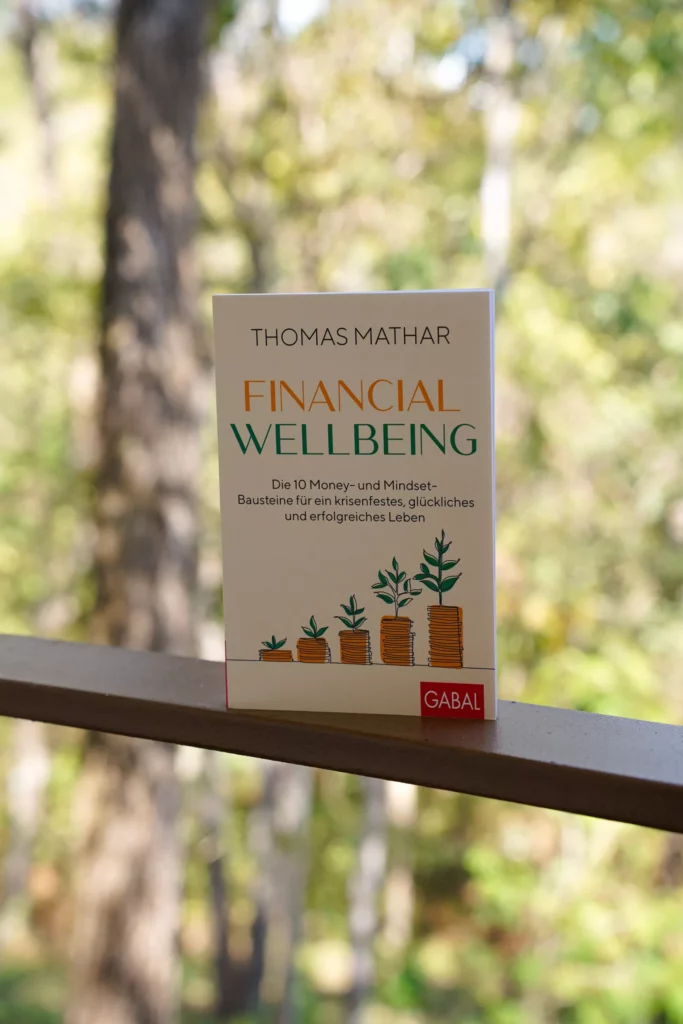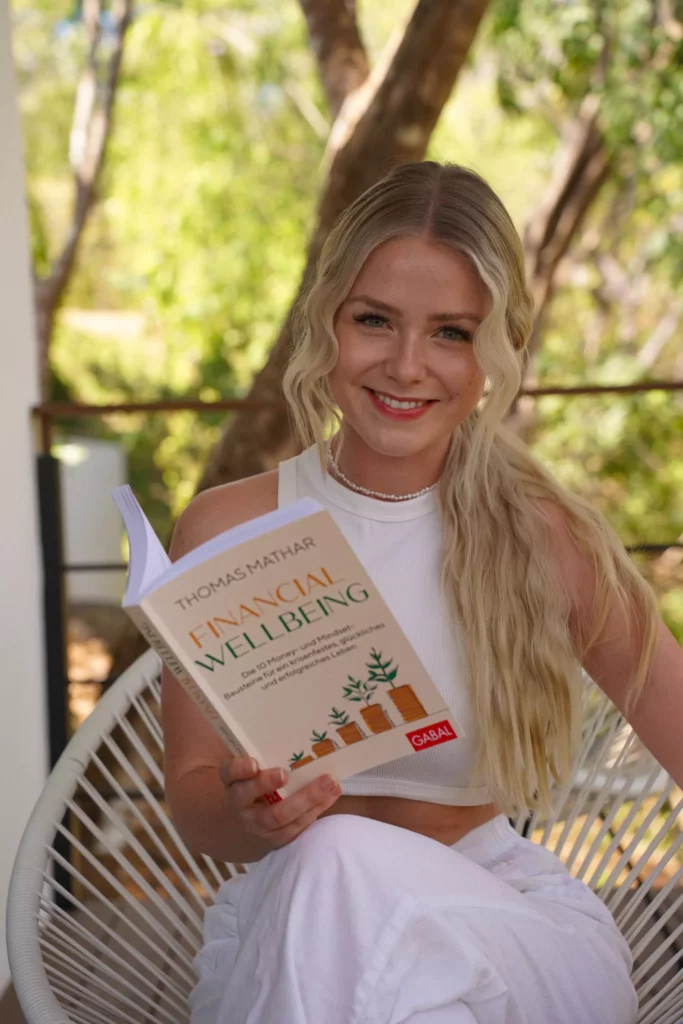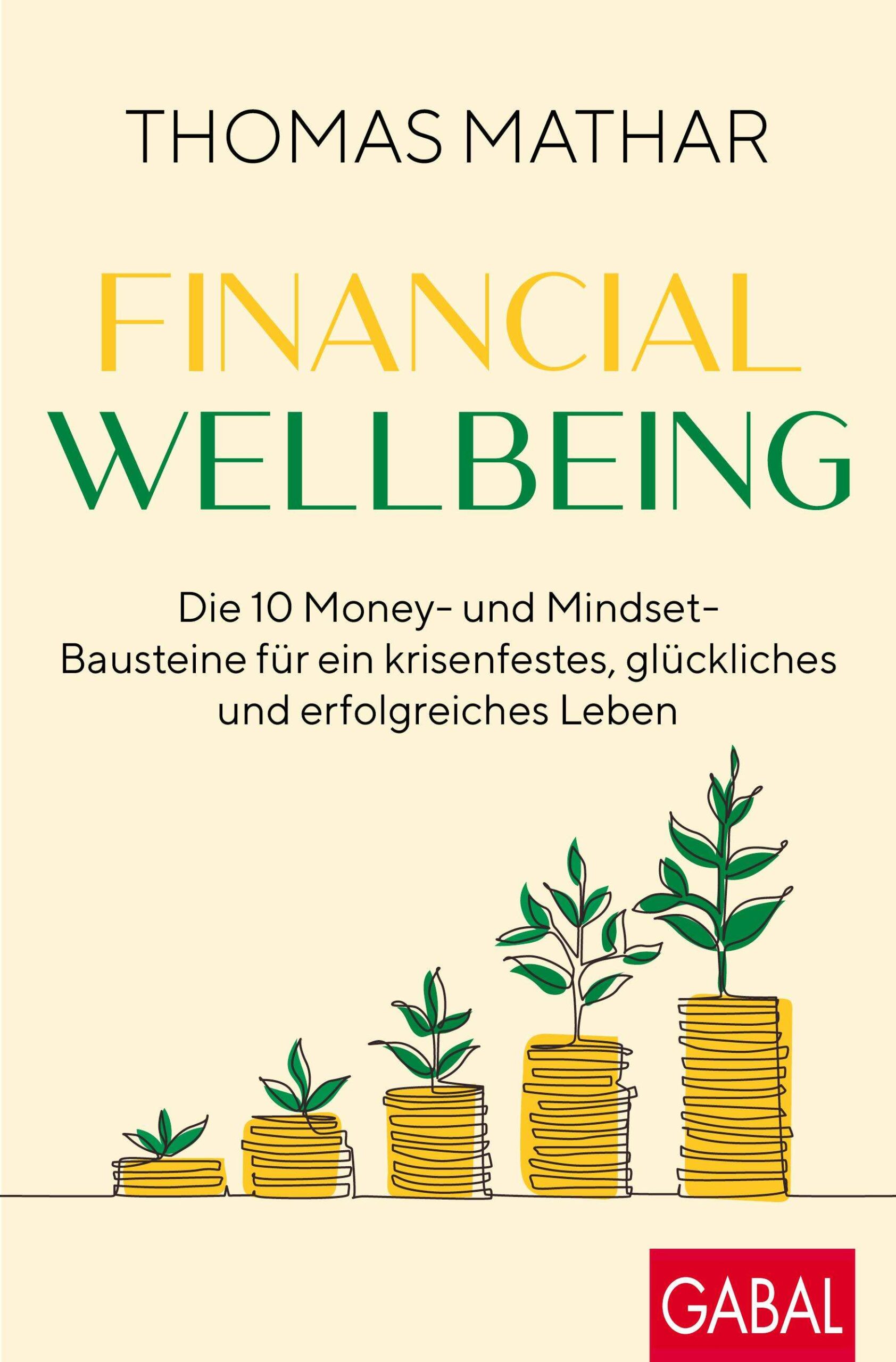
by Thomas Mathar is an interesting little financial guide for beginners. It's actually a somewhat more comprehensive handbook that doesn't just deal with the financial aspects of life. It is also about our mentality and the thinking behind our financial decisions, based on findings from the behavioral sciences. Daniel Kahneman and co. send their regards. It offers tangible and evidence-based tips for optimizing financial well-being.
In terms of content, the author divides his book into ten building blocks, as the subtitle suggests. Each of these building blocks deals with one aspect of financial well-being. The first five focus on the financial level, while the other five deal with the mindset. From income to smart consumer decisions and crisis management: Thomas Mathar covers a wide range of topics that should appeal to every reader.

However, the technical and linguistic level is geared more towards beginners and inexperienced readers in the large subject area of finance. Anyone who has already read a handful of financial guides is unlikely to increase their knowledge with this book. Beginners, on the other hand, will find a solid and well-prepared work.
What makes this book particularly different from other financial guides is its focus on the human psyche. Thomas Mathar repeatedly describes how it influences our financial decisions. He emphasizes that it is not enough just to give financial advice. We also need to understand how the human brain works in order to make truly informed decisions and stick with them in the long term.
According to the author, many situations in which we find ourselves are directly or indirectly attributable to our psyche. This is because it plays irrational tricks on us from time to time, but it is a very important component.
In the introduction in particular, Mathar addresses a further complex of topics: Times of crisis. He not only addresses the financial impact of crises. He also emphasizes the importance of a constructive attitude and a resilient mindset. And he encourages readers not to focus solely on the external factors that they cannot control. Because it is much more important to focus on how they can deal with these challenges themselves. Exactly the approach that I already more than appreciated from Stephen Covey.
"Can you name a crisis that has occurred in the last five years? Any - for example, a political crisis, an economic crisis or a health crisis? You probably can. Because in the last few years, we've been sliding from one crisis to the next."
Thomas Mathar
Through in-depth research and practical examples, the author succeeds in communicating even complex concepts in an understandable way and passing on concrete recommendations for action. He does not shy away from addressing controversial topics and questioning traditional ways of thinking. I always had the impression that he had conscientiously researched the topic and not simply declared personal experience to be the pattern. Unfortunately, this is something that far too many financial book authors have almost made the standard.
"A proper money mindset recognizes the positive and the pessimistic in this big picture. And with a proper money mindset, we plan our finances differently. I don't want to (and can't) tell you to stop worrying about money. I would, however, encourage you to worry in a better, more insightful and empathetic way."
Thomas Mathar
At this point a few words about the author:
Dr. Thomas Mathar has been Head of the Behavioral Research Centre at Aegon UK, a renowned British investment and financial services provider, since 2017. He is characterized by his expertise and passion for researching human behaviour. In extensive studies, he analyzes the profound connections between instincts, motivations, abilities and environmental factors that influence people's financial decisions. Through his work, he makes a significant contribution to understanding the mechanisms behind our financial actions. On this basis, individuals can be encouraged to make better and more sustainable financial decisions.
"Perhaps you also know someone who claims to be able to get by in life with little money. Or someone who says that money is not that important for the lifestyle they and their household are striving for. It may even be true in that individual case. But as a rule, it is most likely not true. Money is important! Without money, life is often difficult."
Thomas Mathar
Haptically, I immediately noticed the very tight softcover binding of the book. This tends to crease quickly and is not quite ideal in my opinion, but not bad either. On the other hand, I really liked the cover. It is simple and yet aesthetically pleasing. The back cover is also well designed.
Visually, the inside of the book is quite nice, but not extraordinarily elaborate or beautifully designed. You will look in vain for colorful accents. Instead, you'll only find LEGO bricks that are a little bizarre and, in my opinion, often inappropriately placed. Of course, I am aware that the book is about different money and mindset bricks. But that doesn't mean you have to place them in such large numbers in the text. It sometimes seems as if the aim was to stretch out the content a little. Visually, at least, they don't make much of an impression.

The 10 building blocks are as follows:
- Income
- Compare
- Clever consumption
- Self-knowledge
- Financial cushion
- Long time horizon
- Retirement provision
- Life planning
- Assets for longevity
- Crisis-conscious composure
In terms of language, the book is written in a very simple and accessible way. Even more complex topics are broken down in a clear and structured way so that they should be understandable for beginners. However, you shouldn't expect anything particularly exciting in terms of content. It mainly provides simple, basic financial tips. Although these are well prepared, there are certainly a number of better books on the subject for the same target group. Nevertheless, all the exercises, reflection questions etc. will certainly help.
The price of the book is clearly too high for my taste. We are talking here about just over 200 pages of beginner's work, not really attractively laid out, in a softcover binding. In my opinion, EUR 25 is at least EUR 5 too much. Especially with the price of books like The richest man in Babylon or also Confident investing for beginners in the back of my mind.
Overall Financial Wellbeing by Thomas Mathar is definitely a book worth reading. It not only offers financial advice, but also provides a holistic approach to a happy and successful life. It encourages you to think outside the box and explore new ways to improve your own financial well-being. This makes it ideal for anyone who is ready to take a closer look at their own money mindset and strive for sustainable change. You will find valuable inspiration and support in this book.
However, those who are already well-read in this subject area should turn to more advanced books.
"It's normal to worry about money. But we worry better when we ask ourselves what we actually need the money for. You can get quite far with a lot of money and the wrong attitude. But with less money and the right attitude, you can get even further."
Thomas Mathar
